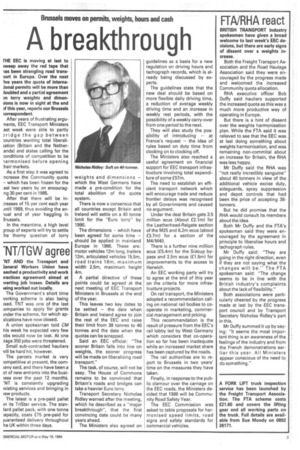A breakthrough
Page 5

If you've noticed an error in this article please click here to report it so we can fix it.
rHE EEC is moving at last to ;weep away the red tape that las been strangling road trans'oft in Europe. Over the next ive years the quota of interne:lona! permits will be more than loubled and a partial agreement xi lorry weights and dimen;ions is now in sight at the end )if this year, reports our Brussels :orrespondent.
After years of frustrating arguments, EEC Transport Ministers ast week were able to partly )ridge the gap between ;ountries wanting total liberali;ation (Britain and the Netherands) and states calling for the )onditions of competition to be larmonised before opening :heir markets.
As a first step it was agreed to ncrease the Community quota which has been frozen for the ast two years by an encouragng 30 per cent in 1985.
After that there will be in:Teases of 15 per cent each year intil 1989, thus avoiding the an-Kiel end of year haggling in 3russels.
In the meantime, a high level group of experts will try to settle he thorny question of lorry weights and dimensions which the West Germans have made a pre-condition for the total abolition of the quota system.
There is now a consensus that all countries except Britain and Ireland will settle on a 40 tonne limit for the "Euro lorry" by 1990.
The dimensions which have been agreed for some time should be applied in mainland Europe in 1986. These are: motor vehicles 12m long, trailers 12m, articulated vehicles 15.5m, road trains 18m, maximum width 2.5m, maximum height 4m.
A partial directive of these points could be agreed at the next meeting of EEC Transport Ministers in Brussels at the end of the year.
This leaves two key dates to be settled the date when Britain and Ireland agree to join the rest of the EEC and raise their limit from 38 tonnes to 40 tonnes and the date when the quotas can be scrapped.
Said an EEC official: "The sooner Britain falls into line on weights, the sooner progress will be made on liberalising road transport."
The task, of course, will not be easy. The House of Commons remains to be convinced that Britain's roads and bridges can take a heavier Euro lorry.
Transport Secretary Nicholas Ridley warned after the meeting, which he described as a "major breakthrough", that the first convincing date could be many years ahead.
The Ministers also agreed on guidelines as a basis for a new regulation on driving hours and tachograph records, which is already being discussed by experts.
The guidelines state that the new deal should be based on more flexible daily driving time, a reduction of average weekly driving time and an increase in weekly rest periods, with the possibility of a weekly carry-over from one period to the next.
They will also study the possibility of introducing at France's request the idea of rules based on duty time from clocking on to clocking off.
The Ministers also reached a useful agreement on financial support for EEC transport infrastructure involving total expenditure of some £57m.
The need to establish an efficient transport network which will encourage trade and reduce frontier delays was recognised by all Governments and caused no argument.
Under the deal Britain gets 3.5 million ecus (About £2.1m) for the Leatherhead-Reigate section of the M25 and 6.2m ecus (about E3.7m) for a section of the M4/M40.
There is a further nine million ecus (E5.4m) for the Sidcup bypass and 2.$m ecus (£1.5m) for improvements to the access to Harwich.
An EEC working party will try to agree at the end of this year on the criteria for more infrastructure projects.
On rail transport, the Ministers adopted a recommendation calling on national rail bodies to cooperate in marketing, commercial management and pricing.
This recommendation is the result of pressure from the EEC's rail lobby led by West Germany which considers that co-operation so far has been inadequate while an increased market share has been captured by the roads.
The rail authorities are to report to Brussels in two years' time on the measures they have taken.
Finally, in response to the public clamour over the carnage on the EEC roads, the Ministers decided that 1986 will be Community Road Safety Year.
The EEC Commission was asked to table proposals for harmonised speed limits, road signs and safety standards for commercial vehicles.
























































































































